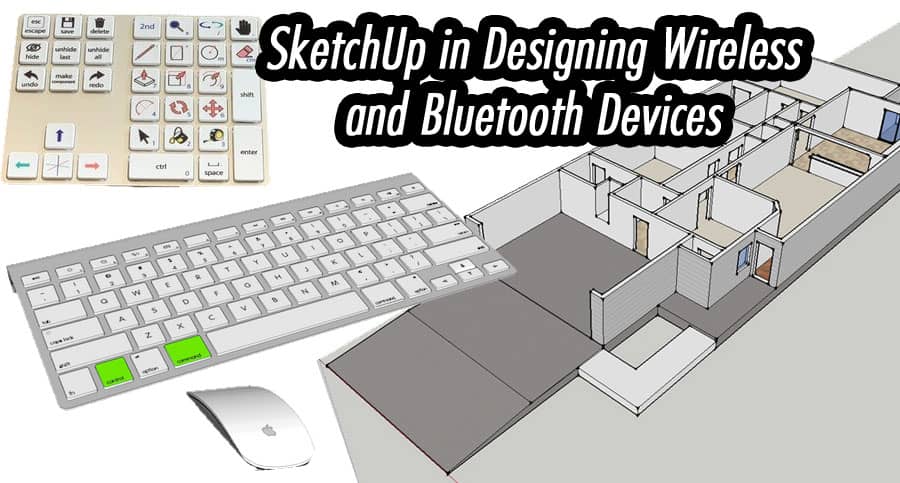In the fast-paced world of technology, the creation of wireless and Bluetooth devices demands precision and innovation. SketchUp emerges as a powerful ally in this realm, offering designers a versatile platform to craft cutting-edge solutions.
Understanding SketchUp
- SketchUp: SketchUp, developed by Trimble Inc., is a 3D modeling software renowned for its user-friendly interface and extensive functionalities. It has evolved from a simple conceptual tool to a comprehensive design suite, empowering creators across various industries.
- SketchUp’s Evolution: Originally envisioned as a tool for architects, SketchUp has expanded its scope to encompass diverse fields, including product design, engineering, and more. Its evolution has been driven by a commitment to user accessibility and technological advancements.
SketchUp in Wireless Device Design
- Incorporating Wireless Technology: SketchUp facilitates the seamless integration of wireless functionalities into device designs. From smartphones to IoT gadgets, designers leverage SketchUp’s precision to embed antennas, optimize signal paths, and ensure efficient connectivity.
- Optimizing Device Layouts: The software enables designers to experiment with layouts and form factors, crucial in wireless device design. SketchUp’s flexibility allows for swift adjustments, ensuring optimal spatial arrangement for components while considering signal propagation.
Bluetooth Device Design
- Bluetooth Integration: For devices reliant on Bluetooth technology, SketchUp provides a platform to visualize and implement these capabilities seamlessly. Designers can simulate Bluetooth modules and assess their impact on the overall device architecture.
- Designing for Bluetooth Compatibility: SketchUp’s detailed modeling capabilities aid in crafting designs compatible with various Bluetooth versions. Designers can visualize how Bluetooth components fit within the device structure, ensuring functional and aesthetic coherence.
Benefits of SketchUp
- Enhanced Visualization: One of SketchUp’s standout features is its ability to generate lifelike 3D models. This visualization prowess aids designers in comprehending the spatial relationships within wireless and Bluetooth devices, fostering informed decision-making.
- Efficient Iteration: The iterative nature of design is streamlined with SketchUp. Designers can swiftly modify designs, experiment with configurations, and instantly visualize the outcomes, expediting the refinement process.
SketchUp Features
- 3D Modeling Capabilities: SketchUp’s robust suite of 3D modeling tools empowers designers to create intricate and precise representations of wireless and Bluetooth devices, ensuring accuracy in design execution.
- Customization and Flexibility: The software’s adaptability allows for customization to suit specific project requirements. Whether designing wearables or home automation systems, SketchUp adapts to diverse design needs.
SketchUp in Prototyping
- Rapid Prototyping: SketchUp accelerates prototyping by offering a platform for quick mock-ups and adjustments. This speed enhances the overall development cycle of wireless devices, allowing for efficient testing and validation.
- Realistic Visualization: The software’s ability to render realistic models aids in presenting prototypes that closely resemble the final product, aiding in stakeholder understanding and decision-making.
Collaborative Design with SketchUp
- Team Collaboration: SketchUp’s collaborative features facilitate teamwork among designers, engineers, and stakeholders. Real-time sharing and feedback mechanisms ensure a cohesive design process.
- Communication and Sharing: Design iterations and ideas can be effectively communicated through SketchUp’s sharing capabilities, enabling seamless exchange and integration of suggestions.
Challenges and Solutions
- Overcoming Design Constraints: SketchUp empowers designers to navigate challenges such as space limitations, signal interference, and device miniaturization by offering tools to simulate and address these constraints.
- Addressing Compatibility Issues: The software aids in foreseeing and mitigating compatibility issues by allowing designers to visualize how different components interact within the device, ensuring seamless integration.
Future of SketchUp
- Advancements and Innovations: As technology continues to evolve, SketchUp is poised to incorporate advancements such as AI-driven design suggestions, further enhancing its utility in wireless and Bluetooth device creation.
- Integration with Emerging Technologies: With the rise of augmented reality (AR) and virtual reality (VR), SketchUp is anticipated to integrate these technologies, enabling immersive design experiences and enhanced prototyping.
Conclusion
In the landscape of wireless and Bluetooth device design, SketchUp stands as an invaluable tool. Its intuitive interface, comprehensive features, and collaborative capabilities streamline the design process, fostering innovation and efficiency.
FAQs
Can SketchUp handle complex wireless device designs?
Absolutely. SketchUp’s robust 3D modeling capabilities allow for intricate detailing necessary for complex wireless device designs.
How does SketchUp aid in addressing compatibility challenges?
SketchUp facilitates visualizing and adjusting components, enabling designers to foresee and mitigate compatibility issues in device design.
Is SketchUp suitable for collaborative team projects?
Yes, SketchUp offers real-time collaboration features, fostering seamless teamwork among designers and stakeholders.
What upcoming advancements can we expect in SketchUp for device design?
Anticipate advancements like AI-driven design suggestions and integration with emerging technologies like AR and VR.
How does SketchUp enhance the prototyping phase for wireless devices?
SketchUp accelerates prototyping by enabling rapid adjustments and realistic visualizations, expediting the testing and validation process.


